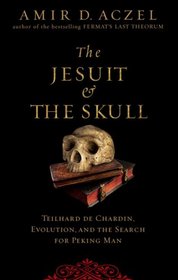The illustration on the cover of a skull sitting on books caught my eye. The title kept my interest. After reading the description on the inside cover, I definitely wanted to read this. So I checked it out from the library. The book is about Teilhard de Chardin, a French Jesuit priest who in 1929 was one of the team that discovered the skull of Peking man. The discovery threw Teilhard, both a devoted scientist and a man of God, into a deeply personal conflict between the new science and his ancient faith. This struggle is at the heart of The Jesuit and the Skull.
To me this sounded quite interesting. I spent some time reading the God Delusion recently, and Richard Dawkins bases a lot of his arguments against the existence of God on evolution. I thought reading something from a different perspective would be interesting. I wanted to see how Teilhard reconciled evolution and faith.
However, his deeply personal conflict wasnt really between science and faith. Although was always working out the little details, he seemed to have his ideas pretty well figured out. From this book, he didnt seem to be constantly battling within himself to resolve the discrepancies. His main conflict seemed to be with the Jesuit order which refused to allow his books to be published, refused to allow him to take prominent positions in the scientific community, refused at times to even allow him to speak publicly because of his thoughts on evolution. He ended up spending most of his life as a Jesuit exiled because of his beliefs.
His deeply personal conflict seemed to have more to do with his friend Lucile. She was most certainly in love with him, and Im convinced that he loved her back, but because of his vows to the Jesuit order, he was not allowed to pursue a relationship with her. This incredible friendship, which could have been so much more, was actually destroyed by his commitment to the order.
By the end of the book I was getting so frustrated that I wasnt sure I was going to be able to finish reading it. He dedicated his life to the Jesuit order and they screwed him. They inhibited his scientific career. They inhibited his relationships. They exiled him away from his family and friends. They made his life hell! He died in exile, without one of his writings being published (as near as I can recall) and away from the woman he loved. What a waste!
I picked up this book to read about Teilhard who was completely unknown to me until I picked up this book, and theres quite a lot of information about him, but theres also a rather lengthy account of human evolution, which is fine but not exactly what I was hoping for. Its mostly tied in to the story of Teilhard, but theres quite a bit more science than I expected. I was most interested in the beginning and end of the book that focused more are Teilhard than on the science of evolution. Theres an interesting bit at the very end of the book about the disappearance of the Peking man skull during the war and where it might have ended up.
To me this sounded quite interesting. I spent some time reading the God Delusion recently, and Richard Dawkins bases a lot of his arguments against the existence of God on evolution. I thought reading something from a different perspective would be interesting. I wanted to see how Teilhard reconciled evolution and faith.
However, his deeply personal conflict wasnt really between science and faith. Although was always working out the little details, he seemed to have his ideas pretty well figured out. From this book, he didnt seem to be constantly battling within himself to resolve the discrepancies. His main conflict seemed to be with the Jesuit order which refused to allow his books to be published, refused to allow him to take prominent positions in the scientific community, refused at times to even allow him to speak publicly because of his thoughts on evolution. He ended up spending most of his life as a Jesuit exiled because of his beliefs.
His deeply personal conflict seemed to have more to do with his friend Lucile. She was most certainly in love with him, and Im convinced that he loved her back, but because of his vows to the Jesuit order, he was not allowed to pursue a relationship with her. This incredible friendship, which could have been so much more, was actually destroyed by his commitment to the order.
By the end of the book I was getting so frustrated that I wasnt sure I was going to be able to finish reading it. He dedicated his life to the Jesuit order and they screwed him. They inhibited his scientific career. They inhibited his relationships. They exiled him away from his family and friends. They made his life hell! He died in exile, without one of his writings being published (as near as I can recall) and away from the woman he loved. What a waste!
I picked up this book to read about Teilhard who was completely unknown to me until I picked up this book, and theres quite a lot of information about him, but theres also a rather lengthy account of human evolution, which is fine but not exactly what I was hoping for. Its mostly tied in to the story of Teilhard, but theres quite a bit more science than I expected. I was most interested in the beginning and end of the book that focused more are Teilhard than on the science of evolution. Theres an interesting bit at the very end of the book about the disappearance of the Peking man skull during the war and where it might have ended up.




